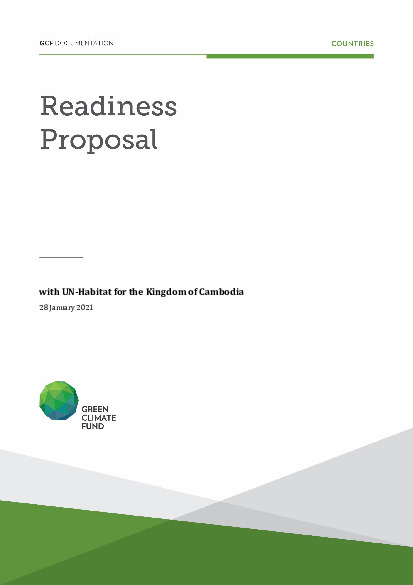Enhanced actions to respond to climate change through sustainable waste management in Coastal Cities in Cambodia

Enhanced actions to respond to climate change through sustainable waste management in Coastal Cities in Cambodia
As Cambodia is highly vulnerable to climate change impacts, it is imperative to improve its water management, especially regarding wastewater and solid waste systems. With increased scarcity of water resources, wastewater reuse will become more necessary as climate change accelerates. At the same time, increasingly severe flooding results in poorly managed solid waste pollution augmenting. While access to on-site sanitation improved access increased to 73% in 2016, a large share of the population in Cambodia relies on non-sewered sanitation. The discharge of untreated effluent in water bodies has a negative impact not only on human health and water systems but also on the environment, as it is linked to the increase of Greenhouse Gas (GHG) emissions1. The combined effects of sea-level rise, coastal flooding and on-shore development issues, mainly solid waste and wastewater disposal, are causing coastal erosion and widespread pollution of livelihood providing ecosystems.
The coastal areas of Preah Sihanouk and Krong Kaeb (Kep City) are among the most populated areas of the country and present an ongoing deterioration of inequality. Besides, the expected impacts of climate change in this region jeopardise poverty reduction and health targets, as hazards are likely to increase in frequency and intensity. Thus, wastewater management remains a daunting challenge. Together with solid waste management, wastewater needs urgent attention to improve hygienic living conditions and reduce environmental degradation, at the time it reduces climate change impacts. As accountability and coordination towards this topic are insufficient among the concerned ministries and other stakeholders, readiness initiatives are crucial to increase resilience.
Hence, GCF funds will be used for revisiting national policy, understanding climate change impacts and improving NDA and private stakeholders’ capacity to reduce climate change impacts through solid waste and wastewater management in Preah Sihanouk (Sihanoukville) and Krong Kaeb (Kep), and therefore support ongoing adaptation and mitigation measures in Cambodia. This proposal aligns with GCF Objective 1: Capacity Building, specifically targeting Outcome 1.3 ‘Relevant country stakeholders have established adequate capacity, systems and networks to support the planning, programming and implementation of GCF-funded activities’; and GCF Objective 2: Strategic Frameworks, specifically targeting Outcome 2.4 ́Strategies for transforming and attracting private sector investment for low emissions and resilience developed and being used ́. The achievement of these objectives will prepare the basis for further work on developing and presenting adaptation finance opportunities, and catalysing private sector engagement in GCF-funded interventions.
The direct beneficiaries of this proposal will be technical officials from the Ministry of Environment, the Ministry of Public Works and Transport, and officials from their respective provincial departments and local authorities in Sihanoukville and Kep, with a particular focus on female government staff. They will benefit from technical assistance and strengthened institutional capacity building to reduce risks associated with climate-induced losses, in addition to strengthened awareness and ownership of adaptation and climate risk reduction processes, and support in delivering improved solid waste and wastewater management strategies. Indirect beneficiaries include population and stakeholders from the target cities and provinces as well as other corners of the country. There is a limited understanding of the linkage between climate change adaptation and mitigation, and sustainable wastewater management in Cambodia’s coastal settlements, so the current proposal will bring together key stakeholders and provide technical assistance to address this gap and build capacity.